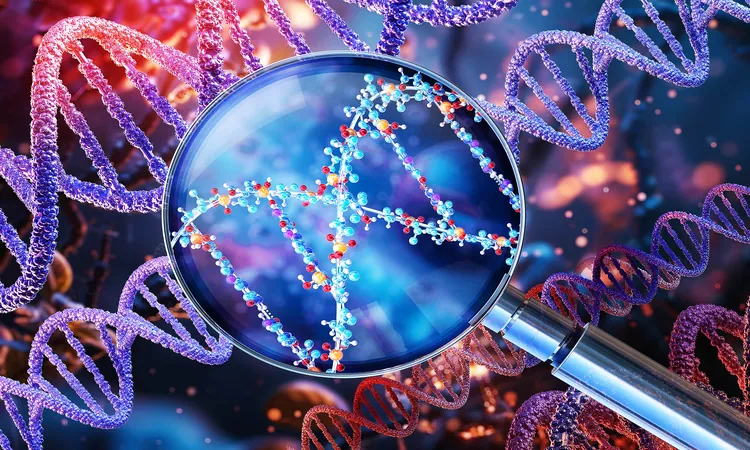
Revolutionary Evolution Discovery: Could We Finally Predict Evolution?
2024-11-04
Author: Wai
Introduction
Evolution has always been perceived as a perplexing and unpredictable phenomenon, intricately sculpting life forms on Earth in ways that often defy our understanding. But what if there’s a hidden order behind this perceived chaos? Groundbreaking research from a team at the University of Nottingham, led by Professor James McInerney and Dr. Alan Beavan, suggests just that — evolution may not be as random as previously thought.
What’s Behind This Discovery?
The researchers embarked on an ambitious project to analyze the pangenome, which is the full set of genes present within a particular species. The primary aim was to investigate whether the course of evolution is dictated by chance or if it follows discernible patterns shaped by the genetic history of the organisms involved.
Understanding the Pangenome
In essence, the pangenome encompasses not only the core genome shared by all individuals of a species but also the accessory genes unique to specific strains. This comprehensive genetic overview allows researchers to pinpoint vital genes necessary for survival and those that confer particular advantages, potentially leading to breakthrough medical and environmental advancements.
Harnessing Big Data for Big Discoveries
To tackle this complex question, the team employed a sophisticated machine-learning technique called Random Forest, analyzing a staggering dataset of 2,500 complete genomes from a single bacterial species. This rigorous computational approach took hundreds of thousands of processing hours, ultimately revealing intricate gene interactions that have drastic implications for our understanding of evolution.
Gene Families and Evolutionary Interactions
The researchers categorized genes into families, allowing for more straightforward comparisons across different genomes. They uncovered fascinating interactions within these gene families; certain genes never co-occurred with others, while some were entirely dependent on the presence of specific gene families. These findings suggest a hidden ecosystem of interactions that could make the course of evolution more predictable than previously imagined.
A New Paradigm for Science
Professor McInerney expressed his enthusiasm about the research’s potential implications, which could transform fields ranging from synthetic biology to medicine. 'The implications of this research are nothing short of revolutionary,' he stated. By demonstrating that evolution isn’t as random as once believed, the study paves the way for numerous practical applications.
Real-World Impact
The practical repercussions of these insights are profound. For instance, understanding gene interactions could lead to innovative strategies to combat antibiotic resistance. Researchers can now target not only the antibiotic resistance genes but also the supportive genes that play a crucial role in their functionality.
Moreover, the implications extend to environmental science and climate change mitigation. By engineering microorganisms with the ability to capture carbon or decompose pollutants, we could devise new strategies to lessen our environmental impact.
Towards a New Era of Personalized Medicine
The predictability of gene interactions may also usher in the next era of personalized medicine, allowing healthcare professionals to foresee disease progression and customize treatments based on an individual’s unique genetic profile.
Rethinking Evolutionary Theory
In conclusion, this astounding research challenges long-held beliefs about the randomness of evolution. By uncovering a level of predictability influenced by genetic interactions, it opens doors to not only better understand life but also to actively participate in steering its evolution.
With vast applications on the horizon — from combating antibiotic resistance to harnessing microorganisms for environmental purposes — the study signals an exhilarating time for scientific exploration and discovery. The revelation that we can identify and manipulate genetic interactions provides a hopeful glimpse into the future possibilities in medicine and environmental science.
As research continues to progress, the question remains: what other mysteries of evolution will we uncover, and how will they shape the future of our world?





 Brasil (PT)
Brasil (PT)
 Canada (EN)
Canada (EN)
 Chile (ES)
Chile (ES)
 España (ES)
España (ES)
 France (FR)
France (FR)
 Hong Kong (EN)
Hong Kong (EN)
 Italia (IT)
Italia (IT)
 日本 (JA)
日本 (JA)
 Magyarország (HU)
Magyarország (HU)
 Norge (NO)
Norge (NO)
 Polska (PL)
Polska (PL)
 Schweiz (DE)
Schweiz (DE)
 Singapore (EN)
Singapore (EN)
 Sverige (SV)
Sverige (SV)
 Suomi (FI)
Suomi (FI)
 Türkiye (TR)
Türkiye (TR)